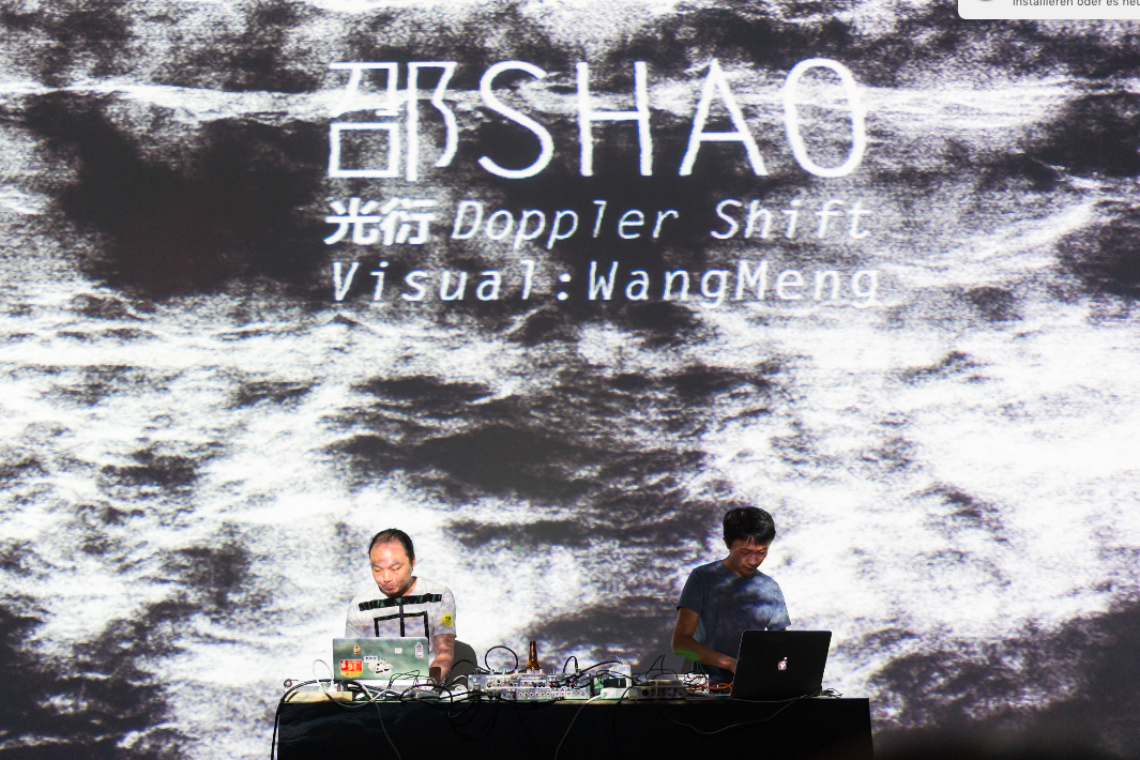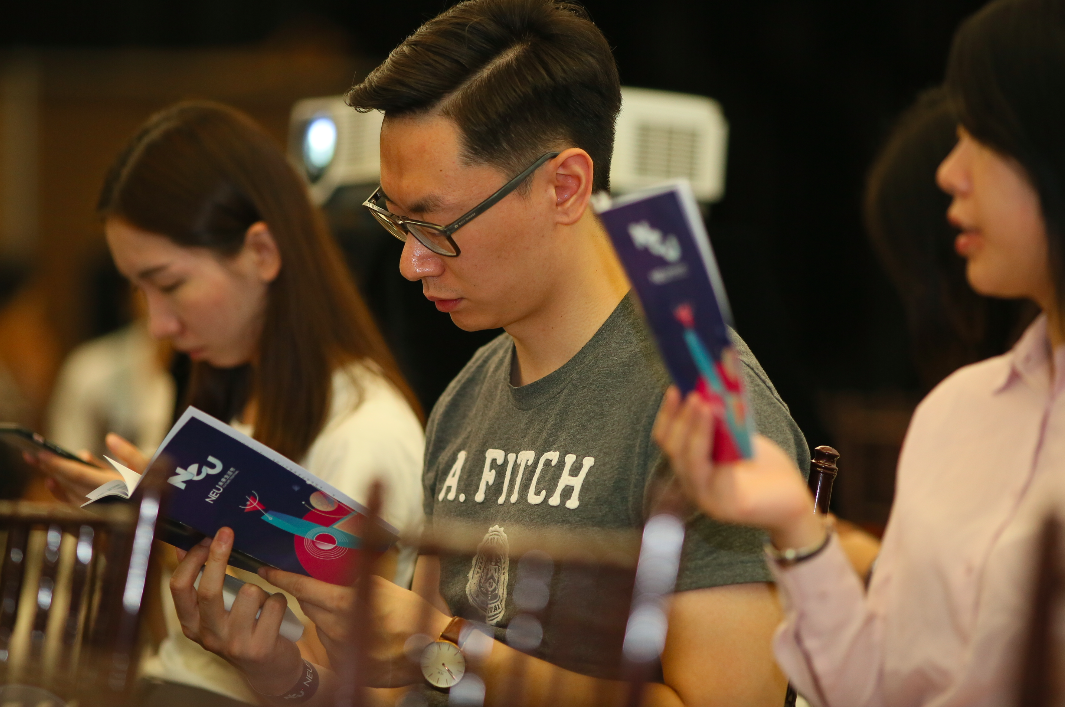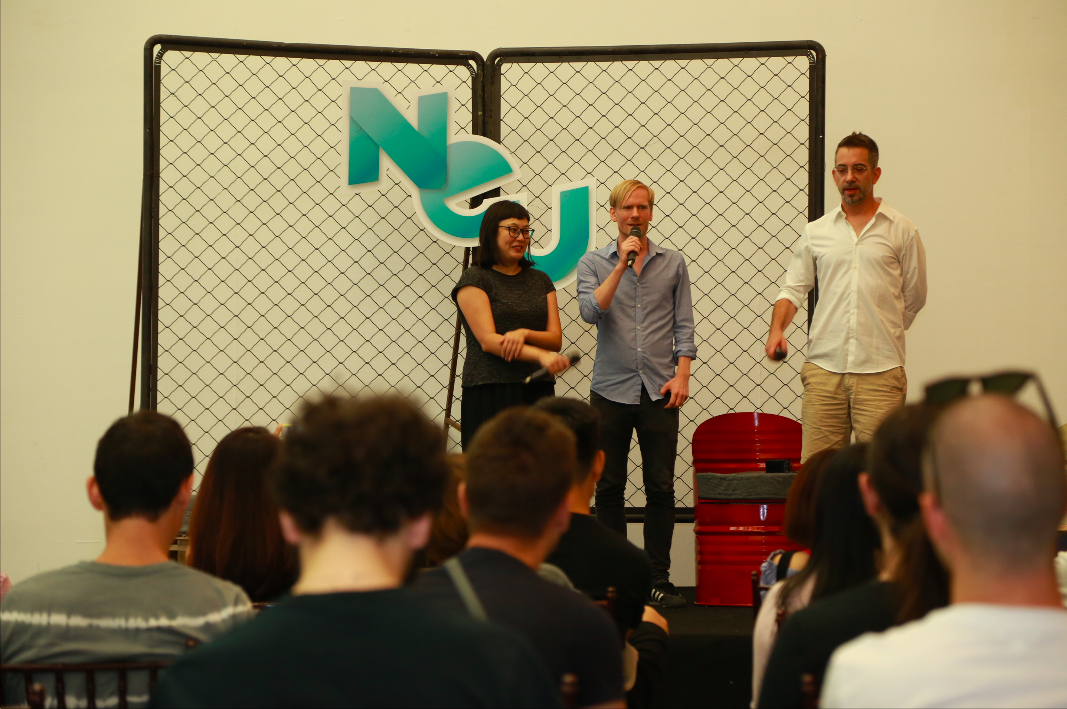Beijing tech conference looks to spark something ‘Neu’
The city and the future get acquainted in a convergence between art and technology.

BEIJING — Philipp Grefer started on a hearty breakfast the day before he wished to plot the future in Beijing. “It’s natural to think about the future now because it’s so omnipresent,” he said, smearing jam and salami on bread inside Gulou East Street’s Cafe Zarah. Patrons from a nearby table aimed their smartphones at a barcode to purchase coffee, while the day’s newspaper headlines heralded innovation hubs, friendly chatbots, and the overseas expansion of China’s largest robot maker. “All these discussions about AI and self-driving cars and VR,” Grefer said. “I’m not sure if it’s as present in the West, but here in China, it really feels like that.”
After 40 years strapped to output-trained boosters, the world’s most populous nation has leveled with the West and launched skidding into its next inflection point. The Chinese government’s intentions are clear: no expense will be spared to stand at the technological frontier and push further out. In July, the Chinese State Council revealed designs for the country to lead as the world’s premier AI force by 2030. After billions committed to research and innovation, pledges have been made to pump billions more. A few months earlier, a groundbreaking artificial intelligence laboratory was established in partnership with the Chinese tech giant Baidu. Will the first cyborg be half-machine, half-Chinese? Observers are calling the effort “Baidu Brain.”
“Everybody in China is talking about innovation right now,” said Grefer, an enterprising DJ and talent manager who moved to Beijing in 2009. “But to really be innovative, you need to have creative people coming together.” Recently, Grefer watched an interview with the music chief of Tencent, who was presented with a question about the last song he streamed. He responded with ruthless precision: “I don’t listen to music. I’m a business guy.” Part of Grefer recoiled in awe — “He was so blunt about it. It was kind of fascinating in a weird way” — but the executive’s brisk mentality, Grefer ultimately decided, reflected the siloed nature of the Chinese tech world. “There’s no appreciation for the art of the creative side.”
Grefer has blond, side-swept bangs and a slight German accent smoothed by a decade outside his home country. He rattled off a list of creative fields — technology, music, film, media. “These industries are all still separated,” he said. “This is not the way it should be.” He cleaned off his plate. “Somehow they should all grow together — more overlaps — to create something new.”
The NEU Future Festival, containing the German word for new, was founded last year by Grefer and his girlfriend, the musician and media producer Helen Feng. More than just celebrate China’s burgeoning tech scene, it aimed to deliver an upgrade. Inside the 798 Art District’s Ullens Center for Contemporary Art, the conference assembled leaders and personalities from a Chinese congee of industries to preach, wax, and mingle over the last weekend in August.
Friday night featured a string of music and visual performances, including a mind-probing set by the Chinese DJ Shao, who is managed by Grefer. The festival’s “future forum” kicked off on Saturday morning. About 150 participants were in attendance for the first panel on “Cyborgs, Genetic Engineering and the Ethics of the Future.”

Abraham Ko, a doctor and health sector investor, described a genome editing tool that recently made successful modifications to a human embryo. “This is a real live technology that we have today,” he said. “So if I want blond hair like him for my kid” — he waved a hand at the moderator beside him, Sean Konieczny, an American tech entrepreneur — “technically, I don’t have to marry a white girl. I could edit the kid’s genes.”
The panelists spoke from an elevated platform, where two cut-up oil barrels, one blue and one orange, were fitted with gray cushions. Konieczny sat on a stack of four-by-fours buffered by a layer of padding. He posed a question to the crowd. “How many people here would want to live to 150 years old or older?” About half the audience raised their hands. Konieczny looked disappointed. A third panelist, AI specialist Sun Wei, tweaked the question. “Imagine you’re about to die right now, and you’re offered an option of living longer at no cost. So for those who didn’t raise your hand, would you consider that — if you’re about to die right now?”
A silver-haired man in the audience beckoned for the microphone. “There’s still the question of the whole world,” he said in a thick European accent. “We already have overpopulation. We don’t have enough water, we don’t have enough food. So where are the benefits of living so long?”
For Ko, that was missing the point. “Yeah, in terms of population, maybe we need to have regulations.” But the driving question, he suggested, lay somewhere between our instincts and our ethics. “As a species, is it ethical to want to survive?” He looked around the room. “I think so.”

Longer lifespans enable longer careers and Christian Kuna, director of human resource strategy at Adidas, soon took to the stage, declaring, “We’re in the middle of a fourth industrial revolution.” He led the next panel in discussing “the risks of AI, of losing our human identity.”
Dalida Turkovic, founder of the Beijing Mindfulness Center, opted for a philosophical approach to the subject. Because AI far outpaces people in computing and intelligence, she said, “the only way for humans to have a chance is to go on emotions.” The issue, though, she stated, is that “we are still learning how to be human.”
Graham Fink, chief creative officer of Ogilvy & Mather’s China operations, dismissed the fears. “All this talk about AI taking over my job — I can’t wait.” He brushed a surfer’s mop of hair away from his face. “Our clients can be very demanding,” he said, adding that when new demands are suddenly dropped on his team, “everyone stays up all night. Especially in China, people are very happy to work all night.” But output from even the most productive workers is constrained. “When AI comes, AI’s gonna say, ‘Twenty-four hours? Fuck you. I’ll give you 1.7 million campaigns in the next 0.12 seconds.’” The audience laughed. “And I think that’s wonderful.”
“I don’t think anybody in this room is really in any danger of a robot or AI taking their job in their lifetime,” said Christian Grewell, co-founder of NYU Shanghai’s innovation program. Manual labor sectors, he noted, were much more exposed to the technology’s destabilizing potential. “If you were kuaidi” — delivery or service workers — “then, yeah, there’s definitely a danger.”
One of the festival’s most anticipated speakers was Joe Xia, co-founder and CTO of Mobike. Introduced in 2015, the orange-framed bicycles, unlocked with a few taps on your phone, have become ubiquitous in Beijing and other Chinese cities, boasting 4.5 million weekly users at the end of last year. This year, the company is broadening its ambitions. “We’re not just doing bike sharing,” said Xia. “We’re going to expand into more and more categories” — including creating software kits that connect Mobikes to other devices, and partnering with the Chinese government to analyze city data for new opportunities.

After a lunch break, the discussion shifted focus to a different form of advancement. Hung Huang, another widely recognized name in the festival’s lineup, appeared onstage for a conversation about gender equality in China. With over 12 million followers on the Chinese microblogging platform Weibo, Huang was articulate and expressive, toggling between Mandarin and English. “I think the biggest supporters of feminism should be Chinese men,” she said. Chinese men face a mountain of pressure to succeed — “If you’re not a CEO, if you’re not Jack Ma, it’s like you’re not even a man,” Huang added. With Chinese women playing a bigger role in the workforce, and fostering a greater balance between professional and home lives, a more equitable society will alleviate some of the pressure on men, and “produce happier lives for all of us,” Huang said. “That’s the goal of feminists.”
Lena Xiao, a Chinese American working in fashion, stood up from the crowd. “Right now in America, there are men who might say, ‘I’m a feminist, I support women’s rights,’ but actually it’s just PR,” she said. “Because in American society, if you’re a feminist, it’s a good thing. But in reality, they’ll continue their harassment.”
Huang honed in on the contrast between the two nations. “There are hypocrites in every country. But here in China, women cannot even call themselves feminists,” she said. “What we are hoping for is not to be like America — and let people come out and lie and say they are feminists — but perhaps our first step could be to let women go out and, at least, say they are feminists. To go out and say, ‘We are women. And so, we are feminists.’” In the back of the room, an expat with short, buzzed hair gave a loud clap, setting off a ring of applause.
After the session, Xiao and Tammy Tian, a Chinese American from Wisconsin, stepped out for a late lunch. Sitting at a window booth inside Timezone 8, a popular cafe across the street from UCCA, Xiao plucked leaves from her salad while Tian picked at a plate of french fries. Both had heard about the event through their network; a couple of their friends were speaking on the panels.
Lena described a disconnect between Western perceptions of China’s tech scene, and what she observed on the ground. “There are still a lot of people who believe that China copies rather than creates. I think a lot of those notions are outdated.” Having worked in marketing and business development at startups, she said the organizers’ choice of venue, inside one of Beijing’s premier art institutions, was a “neat convergence” and “on-brand.”
“Beijing is a good place for this kind of thing,” agreed Tian. “People in Beijing definitely want to share.” But Tian observed that the majority of the festival’s speakers were foreigners and the audience was skewed to favor expats; she had met only one Chinese national at the conference so far.
“I’ve been in more Chinese entrepreneurial circles,” said Xiao. “They also have these large events and forums.”
“Do they merge, though?” Tian asked.
Xiao thought for a moment. “Not as much as they could.”
“I’m actually trying to start a magazine,” Tian said. “It’s going to be called Prism. It introduces both expat startups and native startups.”
“There’s still an information inefficiency,” Xiao said, nodding. She noted the time. Someone they knew was about to speak on a panel. The afternoon sessions featured meditations on the future of media, storytelling, and the film and music industries. One speaker was listed as a writer, scenarist, script supervisor, columnist, and public speaker. Another bio introduced an artist, animator, technician, teacher, consultant, entrepreneur, and producer. Xiao and Tian grabbed their coffees and hurried back inside. In the future, the more you do, the less you might get left behind.





